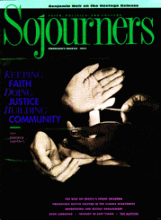The week before attending Sojourners 20th anniversary festival I participated in a conference at the Center for Ethics and Social Policy in Berkeley. Some 20 invited participants, mostly academics, spent a week discussing The Good Society with Robert Bellah and his associates.
There were some obvious parallels between the two events. One was earnest and analytical; the other evangelical and prophetic. Both were concerned with saving the world; both contained indictments of the existing social order in America; and both issued calls for repentance and conversion.
The Good Society will be seen as a sequel to Habits of the Heart, which caught the attention of the academic world six years ago (see "Beyond Heartfelt Habits," October 1986). This in many ways is a better book: better organized, more readable, more persuasive.
In Habits the authors argued that it is difficult to live a morally coherent personal life in America today because of the radical individualism of our culture. In their newest book, Bellah and his colleagues contend that this society's fascination with individualism is the cause of the failure of our major social institutions.
Defining institutions as the normative patterns or values that give meaning to common life, the authors offer a spirited critique of our political, economic, educational, and religious institutions, and the popular culture of individualism that sustains them. Institutions today are dominated by a tradition of individualism that has been inherited from John Locke, and by some particular historical patterns that have developed in American society since mid-century.
Read the Full Article

